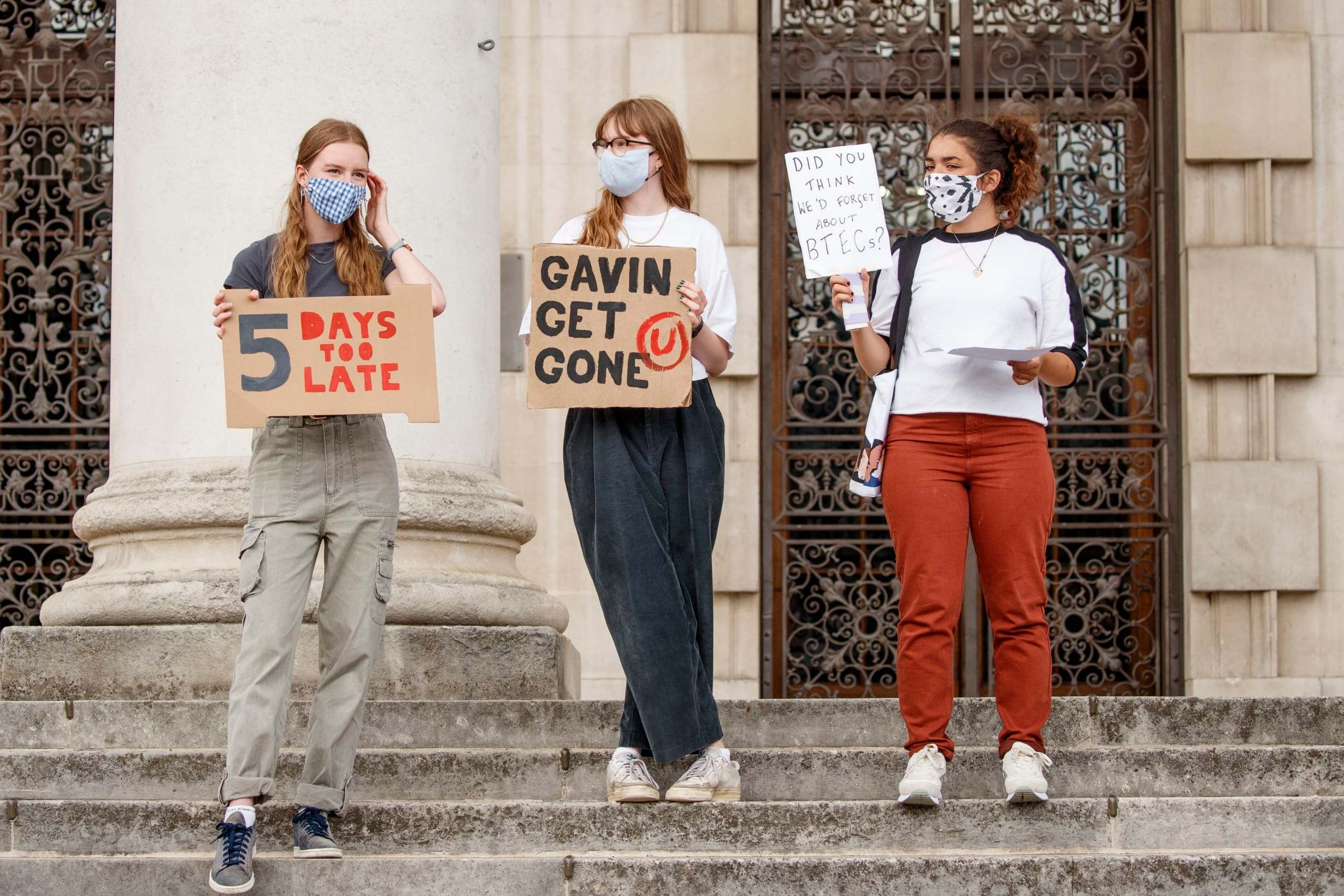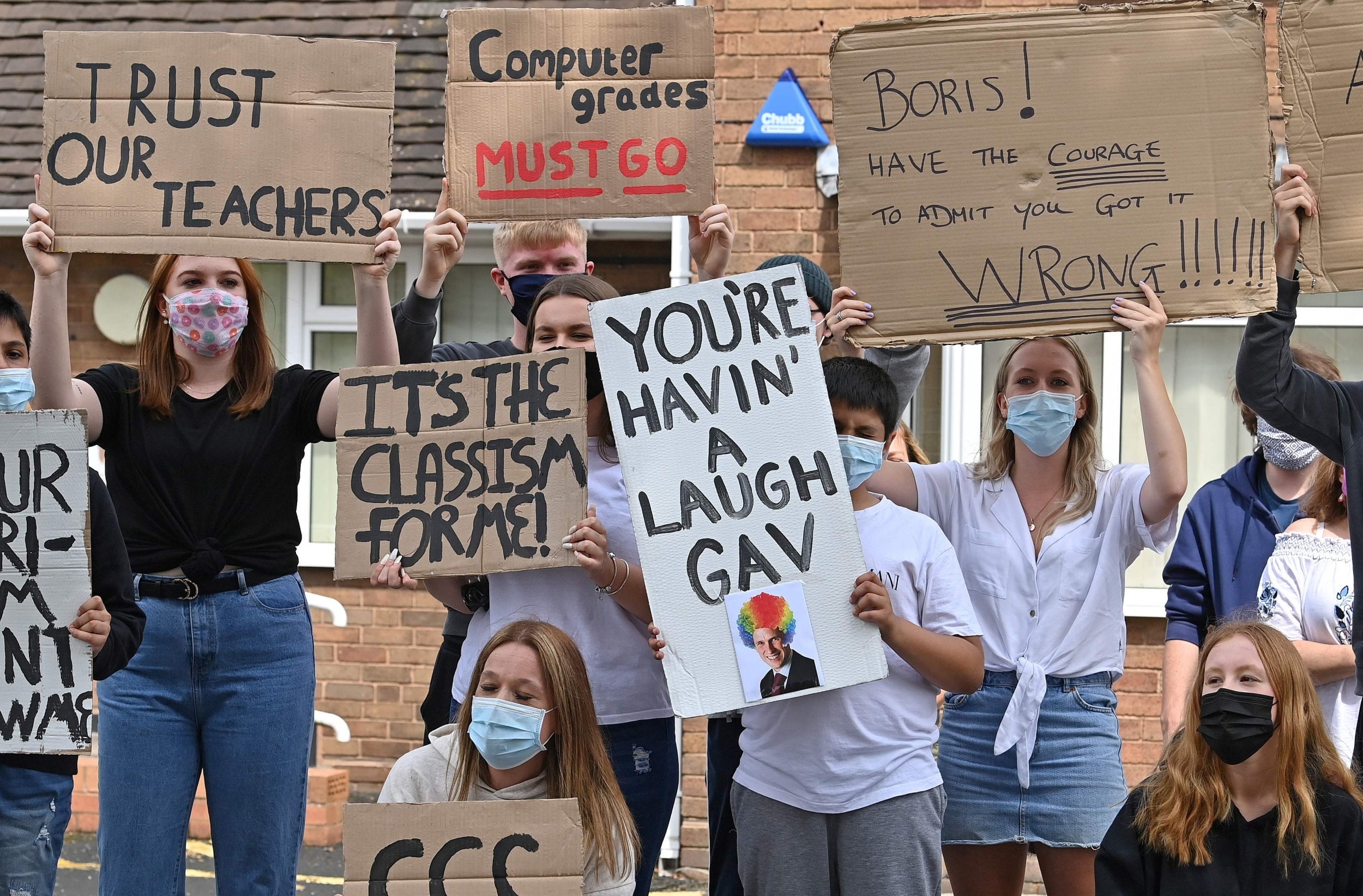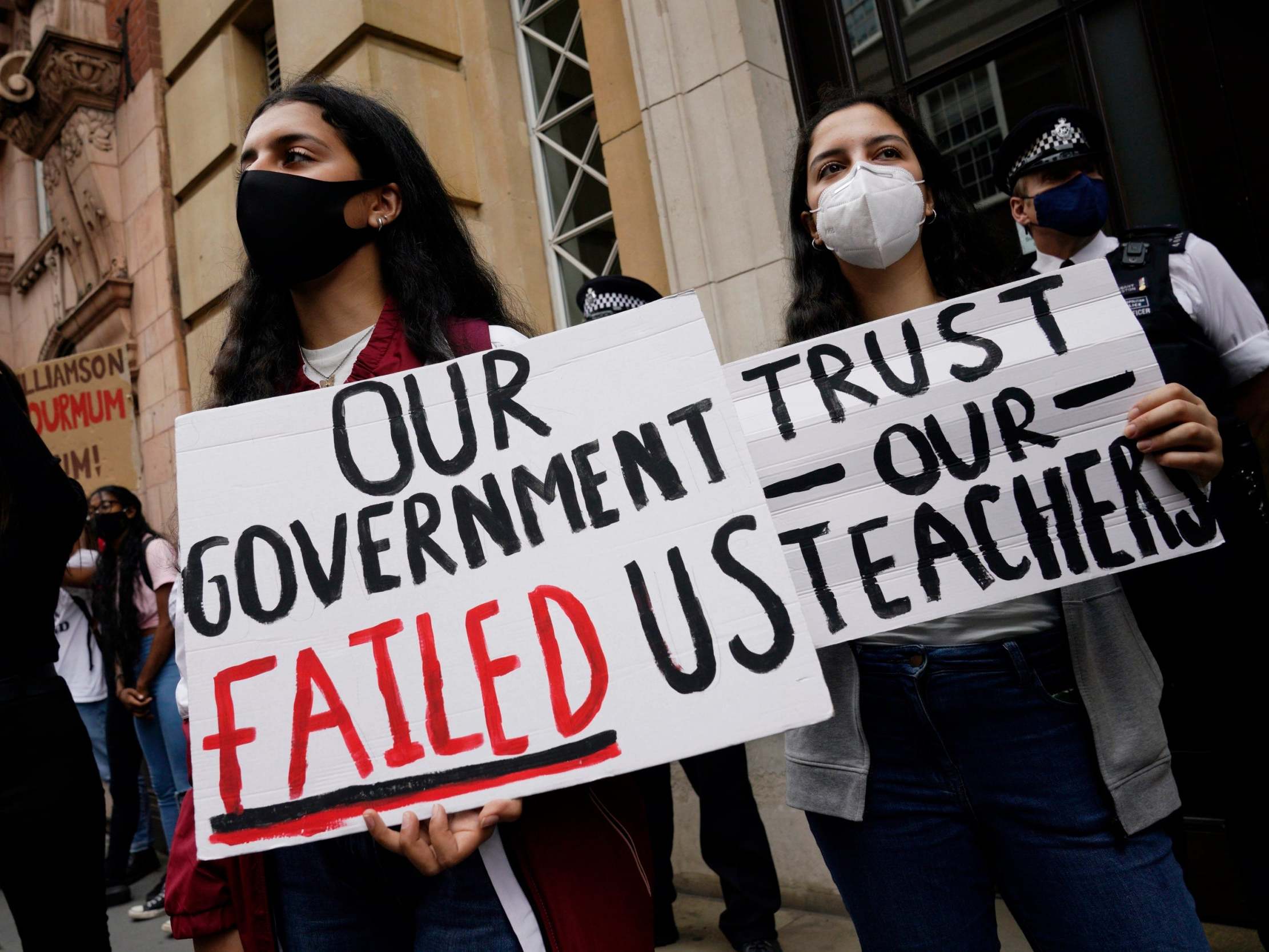A-level confusion increases as universities await teacher-predicted grades from Ucas
‘Do I just accept my second choice?’ asks one pupil

Your support helps us to tell the story
From reproductive rights to climate change to Big Tech, The Independent is on the ground when the story is developing. Whether it's investigating the financials of Elon Musk's pro-Trump PAC or producing our latest documentary, 'The A Word', which shines a light on the American women fighting for reproductive rights, we know how important it is to parse out the facts from the messaging.
At such a critical moment in US history, we need reporters on the ground. Your donation allows us to keep sending journalists to speak to both sides of the story.
The Independent is trusted by Americans across the entire political spectrum. And unlike many other quality news outlets, we choose not to lock Americans out of our reporting and analysis with paywalls. We believe quality journalism should be available to everyone, paid for by those who can afford it.
Your support makes all the difference.Thousands of students are still in the dark over whether they can secure places on university courses, as institutions wait to receive the new teacher-predicted grades from Ucas, the admissions service.
Education secretary Gavin Williamson resisted pressure to resign, as prospective students spoke of “shattered dreams” and lost years after the government’s U-turn on Monday.
The U-turn, which allowed students to apply with their original teacher-predicted grades, if higher, means many are now theoretically able to apply to their first-choice institution.
But a source said that Ucas had still not received any of the teacher-predicted grades from exam boards, so had been unable to forward that information to universities.
Some universities reacted by saying they would be unable to confirm places until they had received the grades, adding further confusion and delay for students.
A spokesperson for Imperial College London said: “Until we have the agreed [teacher-assessed] marks from Ucas, we will be unable to provide further confirmation to our candidates.
“We know this is a really stressful time for many students and their families. And we are doing our best to provide clarity. We are working around the clock to deal with individual cases as soon as possible.”
The University of Southampton, another university in the highly selective Russell Group, urged students not to give up on offers from elsewhere as it was still awaiting the information from Ucas.
“We understand how difficult the current situation has been and we will update students as quickly as we can once we have received their Centre Assessment Grades from Ucas. In the meantime we recommend students don’t release themselves from other offers they have accepted.”
The university has committed to accepting all students with the right grades, but said some may have to defer until next year.

And the University of Leeds said that once Ucas “confirms grades” it would “look at your position again in light” of the teacher-predicted grades, “if you accepted an offer from Leeds, firm or insurance, but did not secure a place with us.”
Following the government’s U-turn on Monday, exam boards are now collating information from schools and colleges before sending it onto Ucas, which in turn verifies the information and passes it to universities, which contact students.
“Ordinarily this process would take weeks and weeks,” a Ucas spokesperson told The Independent. “But I can tell you this process is going to have happened by Friday this week.”
“Ucas are writing to students this evening to tell them exactly what the process will be and how we will support them.”
Labour accused the government of “repeated incompetence” over the A-levels chaos, the latest in a string of U-turns during the pandemic on key policy areas.
Universities have now been left scrambling for information from students directly, encouraging them to reach out to share with them their teacher-predicted grades.
“If you’ve received better news as a result of the government’s change of position and want to revisit your offer from us, please call us,” tweeted the University of Surrey. And Universities UK, which represents more than 130 universities, urged students to reach out to institutions directly after the government’s volte face.
Universities UK said the last-minute change has presented institutions with widespread challenges, and called for increased government support and “urgent clarification on a number of crucial issues”.
“This will cause challenges at this late stage in the admissions process – capacity, staffing, placements and facilities – particularly with the social distance measures in place,” Alistair Jarvis, the group’s chief executive, said.
“This policy change happened very quickly and as such has presented a number of practical challenges and difficulties,” a spokesperson told The Independent.
“These could indeed result in a risk that not all students will be able to get their first choice university this year. This will vary by university or by institution, but ultimately, the flexibility universities are offering can only extend so far because of these practical reasons.”
Lois Lawn had to wait five days to find out that she’d gotten into her second-choice university after A-level results were released.
“It’s probably been one of the hardest weeks ever,” the 18-year-old, who will study physics at Surrey University, told The Independent.
Ms Lawn, like other students, has been phoning up universities to try and secure a place after the government announced pupils could use teacher-estimated grades which were higher than calculated grades handed out.
The U-turn followed a backlash over a controversial moderation system, which lowered tens of thousands of grades and sparked protests.
Mr Williamson, the education secretary, has since apologised for the “distress” caused by the abandoned policy which was intended to give fair results to pupils, who could not sit exams because of the coronavirus crisis.
The algorithm – used to moderate the process of awarding grades and avoid grade inflation under teacher estimates – came under fire over its perceived unfairness and the way it particularly appeared to penalise bright children from disadvantaged schools.
Students demanded Mr Williamson resign at a protest in Leeds on Tuesday.
Olivia Hullah, who studied at Heckmondwike Grammar School, told the crowd that she had been rejected by both of her university choices due to her grades being downgraded.
The 18-year-old said: “Because of the Tory government decision to use a computer algorithm, I have to put my life on hold for a year. This is a real experience and real people are dealing with these problems.”
Ms Hullah added: “I think Gavin Williamson can apologise but there’s been no action. He should apologise and resign. He’s made a big mistake. The reason I’m not going to university this year is because of him.”
For Zoe*, the change means she has made her offer to study at Oxford University. However, her place has been deferred to next year.
“I was one of the lucky ones because my college were kind enough to honour my place for 2021,” she told The Independent, “but had it not been for the government’s algorithm I likely would have been able to go to university this year.”
Now Zoe, whose calculated grades on results day were lower than her offer, says she is planning a gap year “at very short notice”.
Oxford University has said it will honour all students’ places who have met their offer conditions with teacher Centre Assessed Grades (CAGs). However, some of these may be deferred to next year.
As the policy change means it has more offer holders meeting their grades than usual this year, the university said it “does face significant capacity constraints”, and needs to “minimise the risk” to students and staff posed by coronavirus.
Other universities, including Kings College London, Newcastle University and Bristol University, have also said they will give people places if their CAGs meet their offers, but may need to defer in certain situations.
In some courses, such as medicine and dentistry, institutions may not be able to admit students this year.
Sheffield University said it would do its best to admit pupils to courses with capacity constraints – such as an externally-determined cap like in medicine – but will guarantee places for next year.
The Russell Group, which represents two-dozen leading institutions, has called for “urgent clarification on the additional support it will provide to help universities with the expected increases in student numbers”.
University College London (UCL) announced that students who had now met its offer to study medicine would be guaranteed only a deferred place.
One student who was hoping to start on that course this year said he did not get the grades he needed, despite having been predicted much higher grades in the past.

James*, who is a young carer, said neither his teacher estimates or his moderated grades will allow him to go to UCL this year, and he also missed his offer for his second-choice.
“It is just hopes and dreams shattered,” the 18-year-old, who did not want to give his last name as he is still negotiating with his school, told The Independent. “Being a carer for my mum and my brother, it was like an escape to go to uni and to live my life.”
He is looking into an appeal – which he says remains “unclear” at moment – and revising 10 hours a day for autumn resits. Now, he says the “best case scenario” is either of those routes allowing him to start next year.
Other students have been faced with uncertainty, even after the government U-turn on Monday expanded what could be used to get students into university.
More than 200,000 people still had not confirmed a university place as of just after midnight on Tuesday, around 20,000 more than the previous two years for the same time after results day, according to Ucas data.
One of these is Elizabeth Todd, who also missed out on her first-choice university with her calculated grades and still does not know what her teacher estimates were – but has been told her college will tell her by Thursday.
“Do I just accept my second choice?” the student from Leeds asked. “Or do I wait to see what these teacher grades are like and possibly not get in?”
Andy Byers, a headteacher in Durham, said students have “settled for their second choices” even with grades now good enough for their first.
However, Cloe Prosser said she only had one option. Her teacher-assessed grades were slightly lower than what she needed – and lower than what she had been predicted earlier in the year.
The student from Stourbridge is waiting to see if the university will offer her a place.
“I’m meant to be moving in a month,” she said.
Join our commenting forum
Join thought-provoking conversations, follow other Independent readers and see their replies
Comments